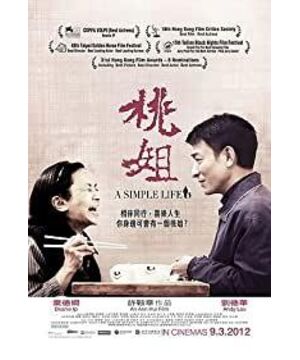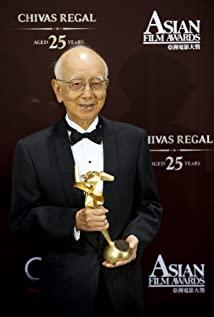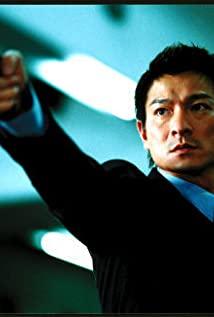The scenery is flowing, the daily scenery is still the same, and all the stories around us are living in our era. However, they, the age of the elderly, are not coming back.
"Sister Peach" is a film based on the real story of producer Li Enlin (Roger). Zhong Chuntao, originally from Taishan, was fostered by a family in Macau since she was a child. At the most difficult time of life, she met Roger's grandmother and was brought to Hong Kong to become a servant of the Li family when she was only thirteen years old. Sister Tao is a "living sister", that is, living in the employer's house, and the treatment she gets is room and board, maybe one or two sets of clothes a year, and a monthly salary of 5 to 10 yuan. It was in that house that she learned how to be a servant. When Sister Tao came to Li's house, she regarded it as her own home and devoted herself to the Li family.
From young to old, although there are only a few decades, there will be countless turning points. Just like Sister Tao's life, every intersection is a cross street with ups and downs. Everything has to be personal, and you will find the most real answer.
1. Analysis of Sister Tao's character:
Although Sister Tao is a servant, her contribution and care for Roger far exceed the responsibilities of a servant. Rather than saying that she is an old servant, it is better to say that she is more like a family member, a hidden "good wife and good mother".
In Sister Tao, the author saw the ingredients of "wife" - cooking rice, cooking soup, doing housework, and raising four generations without having children. At the same time, there is also a "mother" component - living with Roger, keeping Roger's childhood supplies and awards at school, thinking about Roger's health everywhere, pampering Roger, even more than his biological mother. Sister Tao closely conforms to the female image of traditional Confucian culture - gentle, virtuous, forbearance, strong, and is an almost perfect female image.
However, Sister Tao felt inferior to her humble identity, so she deliberately concealed her identity as a servant in the nursing home. When an old man laughed at her name as a servant, she said angrily, "How did I offend you?" Emotional restraint is bound by the shackles of social values. For example, she loves Roger very much but dares not go beyond the master-servant class relationship to ask for Roger's care.
Even so, in the author's eyes, she is still a woman with demands and pursuits, even if her demands and pursuits are limited to her family. The English title of "Sister Peach" is "A Simple Life" - a simple life. For Sister Tao, it may be simple, but in my opinion, Sister Tao is not simple at all. For example, Sister Tao loves Roger very much. The things she gives Roger are carefully selected. For example, when she buys vegetables, two kilograms of vegetables are not needed. After picking, there are only six taels of vegetables left, and those six taels are the freshest. The most tender, this is not easy; Roger likes to eat sea fish, the fish she steamed for Roger must be the freshest, and pick the most tender part for him to eat, this is not easy; the servants in old China would not cook by themselves Bread, usually bought outside. But Sister Tao made bread by herself, for the health of her family. This is not easy; Sister Tao gave the best things to her family, and she ate the rest by herself. In her life, only her family members were happy to see them happy. Just be happy, it's not that easy.
In addition, there is a scene where Roger asks Sister Tao why she didn't get married when she was young. Obviously many people have pursued her, such as fish dealers, medicine dealers, and small businesses. Why didn't they agree? Sister Tao said one word - "fishy". Roger then teased her and said, "Do you like my dad?" Sister Tao smiled and said, "Bah." In another scene, Roger's mother came back from the United States to visit Sister Tao at the nursing home and brought her bird's nest. After tasting the bird's nest, Sister Tao asked if there was no ginger in it? Roger's mother said yes, but it didn't taste fishy to her. But Sister Tao insisted on saying "fishy". Roger said with a smile, Sister Tao's mouth is very picky, and the whole family has been accustomed to being picky with her mouth for so many years. Later, Roger's mother gave her money, but Sister Tao insisted not to give her two more pairs of socks, but she accepted them, saying that the socks were good.
It can be seen that although Sister Tao has a humble status and a low self-esteem, she has strict requirements in taking care of Roger and his family's daily life and food, her responsibilities, personal feelings, and principles of being a person. set of criteria and pursuits. The word "fishy" appears twice in the movie, which shows that the director is emphasizing the pursuit of perfection, lofty, principled and backboned attitude towards life in Sister Tao's heart. It's not simple at all.
In addition to knowing how to think about Roger and his family, Sister Tao also thinks about other people. The old man played by Qin Pei in the nursing home often asks Sister Tao to borrow money to do some mysterious things. When Roger found out that he was borrowing money to find a "hair shampoo girl", Sister Tao was still willing to lend him money. The reason was very simple. Sister Tao said, how many years does he have? It's okay to lend him some money if it makes him happy. Another example is when Sister Tao persuaded a patriarchal grandma to go home with her daughter for the New Year when the Spring Festival was approaching; Roger's mother brought bird's nest, and Sister Tao would share it with other elderly people, etc. These little details can show that Sister Tao is a kind, tolerant, considerate woman, willing to give and share.
2. Unrelated feedback:
The relationship between Sister Tao and Roger in the movie is a "mother-son relationship" without blood. This "mother-son relationship" is implicit and restrained from beginning to end in the film, without any overly hypocritical exposure. At the beginning of the film, it shows the daily life of Sister Tao and Roger. Sister Tao carefully selects the freshest vegetables in the vegetable market. She brings the steamed fish to the table. Passing the rice bowl handed by Sister Tao, grilling rice, these are conditioned reflex actions developed over the years. After the meal, Roger said that he wanted to eat beef tongue, but Sister Tao wouldn't let him eat it. He said that he had just completed the bypass surgery last time, and he can no longer eat foods with high cholesterol. But Roger still said lightly that he wanted to eat braised beef tongue, and Sister Tao ignored him. Obviously, Roger understood Sister Tao's mind. For so many years, Sister Tao loved him so much, just like when his mother didn't let him drink soda when he was a child, Sister Tao secretly bought him a drink. Sure enough, as Roger expected, the next shot was when Roger was on a business trip, Sister Tao was making braised beef tongue for him. It can be seen that under the cover of the faint master-servant relationship, the tacit understanding between the two is very deep.
Later, Sister Tao had a stroke and volunteered to resign and live in a nursing home. Roger wanted to pay the hospital bills for her, but she insisted on paying it herself, not wanting to cause trouble to Roger. When Roger came to visit her, Roger called Sister Tao's godmother, and Sister Tao called Roger her godson. This is a white lie. Although they are not related by blood, such a title will not make the audience feel awkward, because the previous foreshadowing has made the audience feel that the relationship between them is like a biological mother and son. But due to the class relationship between master and servant, although Sister Tao's love for Roger is very strong, she does not dare to ask him in return: when Roger gave her money, she asked him to save some money, saying that she had enough; Tell Roger that if you don't have time, you don't need to call her, but she is really looking forward to Roger's call, but she doesn't dare to show it.
During this period, Roger's mentality changed - from indifference to Sister Tao to conscience discovery. There was also an obvious change in his actions - from the young master who opened his mouth for food and tea to Sister Tao who had a stroke, he finally turned to take care of the person who had served him all his life. These transitions are quiet and slow, not sudden changes or crying and laughing. These changes in attitude and actions are: after Sister Tao suffered a stroke and was admitted to a nursing home, Roger found that she was at a loss and was not used to her life without the care of Sister Tao; she saw the beef tongue that Sister Tao left in the refrigerator for him; Watching Sister Tao organize and preserve his childhood supplies and old photos, telling the mixed feelings of old memories... The layered and powerful "quantitative changes" prompted Roger's "qualitative changes" in mentality and actions, which made him truly transcend the original In the gap between classes, she feeds back Sister Tao. It can be said that the author believes that it was Sister Tao who taught Roger how to love and be loved, how to break out of indifference, how to care for and tolerate others, and how to be grateful.
Just as Roger said to his sister after Sister Tao's second stroke, "It's such a coincidence that when I had heart bypass surgery, Sister Tao had a healthy body to take care of me. If she didn't take care of me, I wouldn't be so Get back to health quickly; now that Sister Tao is ill, I happen to have a healthy body to take care of her. If the order of things was reversed, it might not be as good as it is now." From this, it can be seen that Sister Tao taught Roger Feedback and gratitude.
When Sister Tao was dying, the doctor asked Roger if she would gradually reduce the medication and allow Sister Tao to die naturally. Roger agreed and told the doctor that he was going to Beijing for a business trip and would only come back in a week. If Sister Tao died during this period, she would be sent to the morgue. , and wait for him to come back for the funeral. After instructing the doctor, Roger's last farewell to Sister Tao was that he helped Sister Tao organize her clothes, cover her quilt, and sort out her socks. Sister Tao was in a coma. This is their final farewell. There are no emotions, no tears of sadness, or even a word of farewell. This life and death seems to be so calm and restrained. In the next shot, it jumps directly to Sister Tao's funeral. The director deliberately downplayed the parting of life and death, but there are also undercurrents under the deliberate downplay. The undercurrent is in the hearts of the audience, and it is gradually paved with the development of the plot. These are already in the hands of the director. What the director wants is not the bitterness and vulgarity of tearjerking, but the prudence and protection, which brings reflection and positive energy to the audience.
3. Realism in "Sister Peach":
As the title of this article talks about, "Sister Peach" is not as simple as a movie, it is still real life - a presentation and reflection on the aging population of Hong Kong and the living conditions of the elderly.
Most of the scenes in the movie are shot in the nursing home. Except for some actors who play the elderly, the rest of the elderly are actually living in the nursing home. The various details of the film truly show the attitude of all classes in Hong Kong towards the elderly. The businessman (played by Huang Qiusheng), who runs a nursing home, hopes that there will be more and more nursing homes, just like convenience stores. They are spread all over Hong Kong. In his eyes, the aging society is only an opportunity to make money; Xue Hua (played by Xue Hua) told Roger, who was going to help Sister Tao go through the procedures for entering the nursing home, a lot about the different prices and charges for people of different nationalities and classes. In their eyes, this is a society in which individuals are divided into high and low grades; in the film, a patriarchal grandma, since the house was transferred to her son's name, the son will no longer visit her, and will no longer bear the burden of the nursing home. Fee, only the daughter came to see her. Grandma's daughter hated her patriarchy, but she still died for Grandma. This detail can reveal the lack of filial piety of some children to their parents at the moment; people and singers from Mid-Autumn Festival TV station come to the nursing home for a show. On the surface, they are showing respect for the elderly, but in fact it is a show. What is even more outrageous is that they send moon cakes to the elderly in front of the camera. Actually took the moon cake back! As soon as the people from the TV station left, a group of elementary school students came to visit the elderly, and the director of the nursing home instructed the elderly to sit still, and there were the next batch of visitors. When caring for the elderly turns into a show and a walk, the air of virtue in society is getting thinner and thinner.
"Sister Peach" not only tells us this warm and true story, but more importantly, conveys a message of caring for the elderly to the audience and society. What the elderly need is not only material supplies, but also spiritual support and care, just like the patriarchal grandmother, who is looking forward to her son to take her home for reunion during the holidays, and the way she often shouts in the middle of the night The old man who goes back to the countryside expresses the message that he wants to go back to the countryside. Corresponding to his inner words, he actually lacks warmth and security, but returning to his hometown will give him a sense of belonging and steadfastness. Director Hui Anhua's main purpose is to arouse the community's attention to the living conditions of the elderly in Hong Kong. Hong Kong's pension benefits and system are far from perfect. Many retirees are just as busy as young people and are still struggling to make ends meet. Since there is no universal old-age security, most Hong Kong people have to prepare for old age right from the start of work. If you don't earn enough money when you are young, then you will only be able to "reserve your life" and "enjoy happiness" when you are old. And many elderly people in their 70s and 80s are still working hard for a living. Some elderly people who have the conditions go to nursing homes voluntarily in order not to cause trouble to their families. However, most nursing homes in Hong Kong are privately run, mainly for commercial profit. The care the elderly receive there can be imagined.
This makes the author feel that while this society is becoming more and more developed, many elderly people who have contributed to it are also forgotten. "Sister Peach" tells us that in the face of fleeting life - the elderly, we should grasp every minute and second to be good to them in the remaining days, because we can't predict whether they will still be there tomorrow. Every old person was as young and blooming as today's young people, but today's young people may not live to this age like the old people. Therefore, young people should cherish themselves, but also cherish and care for the elderly.
4. Director Xu Anhua and Feminism:
Except for "Sister Peach", the female images created in many films directed by Xu Anhua are very consistent with the traditional Confucian female image. For example, in "Forty Women", Xiao Fangfang plays a wife who has to take care of her husband, son, and the elderly. The father-in-law with dementia, the pressure of life and family has overwhelmed her, but she is still strong and optimistic about life; another example is the single mother Guijie played by Bao Qijing in "Days and Nights in Tin Shui Wai". After that, he faced life firmly, and lived with his son. Although he was poor, he had a backbone. He gradually broke the estrangement with his son and his old mother. These are all similar to the image of Sister Tao.
From a feminist perspective, these "perfect" images of traditional Confucian women are produced under the repression and demands of a patriarchal society. In Xu Anhua's films, most of them show the truth, goodness and beauty of women, and there are few films that show the beautiful qualities of men. Based on director Xu Anhua’s personal experience, including her unmarried at the age of 64, living with her old Japanese mother, as well as the tendency of film image building and the central idea of film performance, I can feel that director Xu Anhua exudes women. The color of ism, but her heart is delicate and full of humanistic care.
When asked by a reporter whether she was a feminist, Director Xu Anhua did not answer directly, she only replied, "I have never felt the oppression of patriarchy, my father was very gentle to me, and I used to go to a girls' school. When studying in the UK, gay students are afraid of being called male chauvinism, and they are gentlemen to girls. I feel that my women’s rights are not exploited in society, but I feel that I have more rights.”
However, as the only outstanding student in Hong Kong at present The leading female director, who has won many international awards, has emerged from a group of male directors. Xu Anhua is indeed not easy. At the age of 64, she has the image of a strong woman with short hair and ears. She has sharp eyes and a personality. She abandons the commercial atmosphere of the movie, and does not follow the trend. She has a keen visual insight into all things in society, and expresses human nature with a perceptual soul. . She sympathizes with and respects disadvantaged groups and shows the best side of women. This is also shown by her own strength and not being influenced by male power. It can be said that this is in line with the characteristics of feminism.
To sum up, the author believes that "Sister Peach" is not a movie, but a real life.
Some people say that the first half of a person's life is an addend, and the second half is a subtraction. Born out of life, fists clenched, hoping to grasp everything, grasp everything. When a person dies, the hands are released, there is nothing in them, there is nothing to take with them. Are you sorry at the moment? No regrets?
The story of Sister Tao and Roger is like the truth, goodness and beauty hidden in the hearts of people. We believe that everyone has a peach sister by their side. When we face the "Sister Peach" around us, we must learn how to get along with her, and how to love and respect her. Her life is fleeting, in the remaining days, cherish her and establish a deep relationship with her. As long as you pay attention, you can afford this relationship.
View more about A Simple Life reviews











